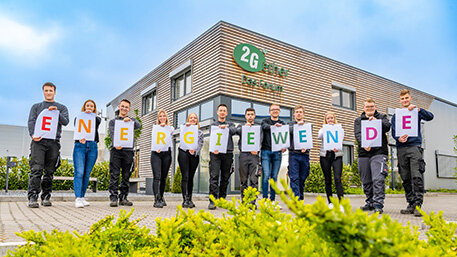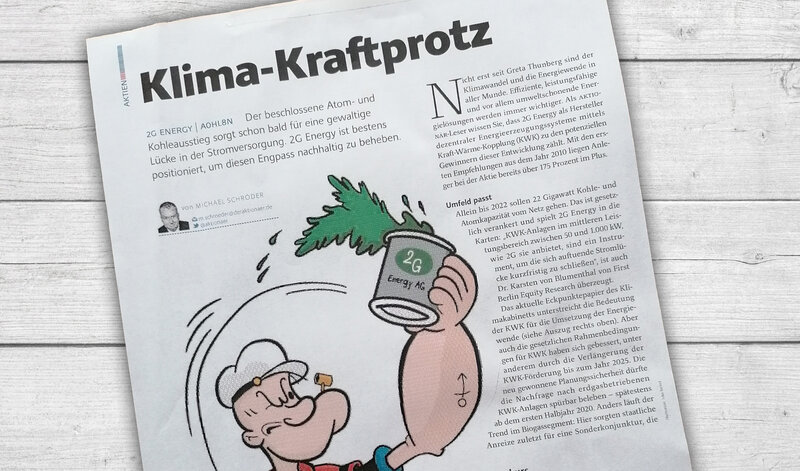The History of 2G: Enthusiasm Meets Adaptability
August 4, 2023

In the spring of 1995, a highly motivated Christian Grotholt, who had recently earned his degree in electrical engineering, crossed paths with Ludger Gausling, an experienced entrepreneur from Heek. A sliding doors moment, as it turned out: In November of that same year, they founded 2G Energietechnik GmbH and laid the foundation for a cogeneration success story that continues to this day.
And it all started with agriculture. Due to the rising demand for alternatives to straw beddings in livestock farming, many barns now perpetually require heat and electricity – a demand that could be perfectly met by oil-fueled combined heat and power systems (CHP). The first few systems went to local customers in the Münsterland region. After 27 years, one stock market launch, and thousands of installed systems all around the globe, the company’s product portfolio and general size have changed drastically. What remains unchanged, however, is the conviction that the energy supply of the future must be a local affair.
Trailblazing Flexibility
A crucial transformation was put into motion only three years after the foundation of 2G: the transition from heating oil to biogas. This was prompted by the rising heating oil prices in 1998 and the simultaneously falling electricity prices due to the market liberalization, a combination that meant heating oil CHP was no longer economically efficient. The company had to adjust its entire portfolio. Shortly after that, in the year 2000 to be precise, the Renewable Energies Act (EEG, short for Erneuerbare Energien Gesetz) provided a light at the end of the tunnel; the conversion of biogas into electricity was to be subsidized for the first time.
Christian Grotholt, who has since become the CEO of the 2G Energy AG – publicly traded since 2007 – recalls, “Several of our customers of the first few years concretely asked about the operation of our CHP on biogas so that they could benefit from the newly created regulations. In doing so, they created real pressure on us to push for new developments, which we could turn into success. Just in time for the amendment of the EEG in 2004 and the growth of the biogas market, we had ready-made products and could profit on the growing market volume.” There were also many lessons learned during this period; as Grotholt admits, “One thing became clear back then: if you want to succeed, you must be quick to adjust to market tendencies. For example, today’s issue of making the operation on hydrogen possible is no different from the earlier efforts to transition to biogas.” He adds to this observation; “Especially in evolved company structures, you need a certain dose of passion, agility, anticipation and, more than anything else, a huge chunk of luck to find the right people for this joint effort always to bring the right products to market-readiness. Ultimately, the team is the deciding factor, and the people make the difference.”
2G has always been focused on fuel flexibility and maximizing product efficiency. In 2008, the company started developing its engine concepts to increase the electrical efficiency of its CHP systems. Initially, the modifications were limited to individual engine components. However, nowadays, 2G is an original equipment manufacturer (OEM), producing its drives in series.
Customer Focused
The customers are and always have been at the center of everything, as Grotholt does not tire of explaining: “Our core philosophy has always been that the success of our customers defines the success of our company. Any increase in efficiency directly decreases the customer’s expenses for gas and increases their profits in return – and then we haven’t even mentioned the energy-political importance of energetic efficiency in itself. Accordingly, the customer’s benefit is always our primary objective at 2G. That is also the motivation behind the idea of expanding the 2G brand of being a team, an us that includes the customer and the employees.”
To this day, farmers and biogas-plant operators are among the most important customers of 2G Energy AG – especially in these times of growing worldwide demand for renewable gases. Over time, however, the range of customers expanded into a panoply of applications that require a stable supply of heat and power – from the standard residential complex over hospitals, hotels, and industrial complexes to entire municipalities and energy utilities.
2G has broadened its range of electrical output to meet its clients' diverse energy demands and requirements. The portfolio now ranges from 20 to 4,500 kW, and the development of solid expertise in system installation has become increasingly crucial. This expertise allows 2G to secure new projects and serves as a foot in the door, according to 2G CEO Christian Grotholt. “Energy solutions – whether for industries or energy utilities – are increasingly complex, and nowadays, they have to pave the way for climate-neutral energy supply security. Therefore, we currently have numerous projects that require the installation of steam boilers, heat pumps, energy storage batteries, or electrolyzers besides the actual CHP.”
The CEO emphasizes the significance of broadening the company's portfolio beyond hardware. He stated that a decentralized energy supply system can only be established with expanding digitalization and services. Along with a vast, worldwide service network comprising partners and 2G staff, the company has a subsidiary - 2G Rental GmbH - that provides various financing models.
Backbone Technology
The various projects undertaken by 2G reflect the current state of the energy market. There is a gradual decline in the use of nuclear and coal-based energy and a rise in renewable energy sources like wind and solar. This increase in energy sources requires the integration of various technologies and systems. The term "sector coupling" is relevant in this context. 2G's power systems can already run entirely on hydrogen, making the company an essential part of the decentralized energy sector. Christian Grotholt believes that 2G's power systems can compensate for the shortage of electricity and heat, especially during times when there is no wind or sun.
Over the past few decades, 2G has been working towards creating the conditions necessary to contribute to the energy transition's success in Germany and worldwide, using its wide range of products and services. 2G has categorized all its strategic efforts into four overarching lead projects to ensure long-term success. These projects aim to enhance passion, strategic foresight, and adaptability for the company.
The four lead projects include three product-oriented projects - digitalization and innovations, the process-oriented organization and planning as part of Lead2Lean, and the Partner Concept lead project. The Partner Concept project has already significantly impacted the company's past development. 2G believes in the power of networks and partnerships. Without them, the company's growth would not have been sustainable. In both the sales and service departments, 2G relies on its partners, service providers, and distributors, who serve as the company's direct link to end-users worldwide.
As the world becomes more complex, 2G strives to simplify its processes and reduce the technical complexity its customers have to deal with while operating its systems. This way, the company hopes to continue down the successful path of 2G with its partners.

